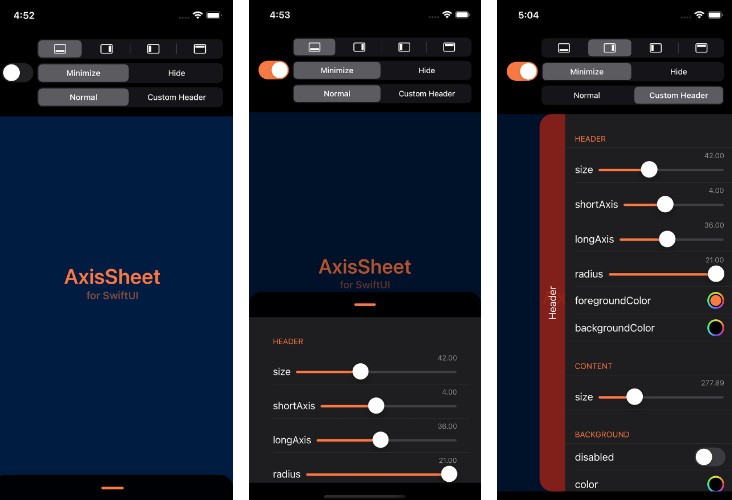PredicateFlow
Write amazing, strong-typed and easy-to-read NSPredicate. This library allows you to write flowable NSPredicate, without guessing attribution names, predicate operation or writing wrong arguments type.
Supported platforms
- iOS 9.0+
- macOS 10.9+
- tvOS 9.0+
- watchOS 2.0+
Installation
CocoaPods is actually the only way to install it.
Cocoapods
CocoaPods 0.39.0+ is required to build this library
-
Add
pod 'PredicateFlow'to your Podfile and runpod install -
In Xcode, click on your project in the file list, choose your target under
TARGETS, click theBuild Phasestab and add aNew Run Script Phaseby clicking the plus icon in the top left -
Drag the new
Run Scriptphase above theCompile Sourcesphase and belowCheck Pods Manifest.lock, expand it and paste the following script:"$PODS_ROOT/Sourcery/bin/sourcery" --sources "$PODS_ROOT/PredicateFlow/PredicateFlow/Classes/Utils/" --sources "$SRCROOT" --templates "$PODS_ROOT/PredicateFlow/PredicateFlow/Templates/PredicateFlow.stencil" --output "$SRCROOT/PredicateFlow.generated.swift"In case you are using PredicateFlow-Realm, past the following script instead of the above one:
"$PODS_ROOT/Sourcery/bin/sourcery" --sources "$PODS_ROOT/PredicateFlow/PredicateFlow/Classes/Utils/" --sources "$SRCROOT" --sources "$PODS_ROOT/RealmSwift" --templates "$PODS_ROOT/PredicateFlow/PredicateFlow/Templates/PredicateFlow-Realm.stencil" --output "$SRCROOT/PredicateFlow.generated.swift"For Xcode 10 only, add a new
Output Filesand paste the following:$SRCROOT/PredicateFlow.generated.swift -
Build your project. In Finder you will now see a
PredicateFlow.generated.swiftin the$SRCROOT-folder, drag thePredicateFlow.generated.swiftfiles into your project and uncheckCopy items if needed
Tip: Add the *.generated.swift pattern to your .gitignore file to prevent unnecessary conflicts.
Usage
Define a class/struct with its own attributes, which implements PredicateSchema:
import PredicateFlow
class Dog: PredicateSchema {
private var name: String = ""
private var age: Int = 0
private var isHungry: Bool = false
private var owner: Person?
}
class Person: PredicateSchema {
enum Sex {
case male
case female
}
private var name: String = ""
private var birth: Date?
private var sex: Sex!
private var dogs: [Dog] = []
}
Build the project. PredicateFlow will autogenerate attributes references to build predicates, putting them in structures.
// Generated using Sourcery 0.10.0 — https://github.com/krzysztofzablocki/Sourcery
// DO NOT EDIT
import PredicateFlow
/// The "Dog" Predicate Schema
internal struct DogSchema: GeneratedPredicateSchema {
private var compoundFieldBuilder: CompoundFieldBuilder
/// DO NOT USE THIS INIT DIRECTLY!
internal init(compoundFieldBuilder: CompoundFieldBuilder) {
self.compoundFieldBuilder = compoundFieldBuilder
}
/// "name" property
internal var name: StringPredicateProperty { return builder.string("name") }
/// "name" property for static access
internal static var name: StringPredicateProperty { return DogSchema().name }
// Other properties of Dog class autogenerated...
}
/// The "Person" Predicate Schema
internal struct PersonSchema: GeneratedPredicateSchema {
private var compoundFieldBuilder: CompoundFieldBuilder
/// DO NOT USE THIS INIT DIRECTLY!
internal init(compoundFieldBuilder: CompoundFieldBuilder) {
self.compoundFieldBuilder = compoundFieldBuilder
}
/// "name" property
internal var name: StringPredicateProperty { return builder.string("name") }
/// "name" property for static access
internal static var name: StringPredicateProperty { return PersonSchema().name }
// Other properties of Person class autogenerated...
}
To type a floawable NSPredicate, just write:
DogSchema.age.isEqual(10).query()
// or
// Vanilla mode:
// NSPredicate("age == %@", 10)
You can also write compound predicate, and use deeper fields:
PredicateBuilder(DogSchema.age > 10)
.and(DogSchema.isHungry.isTrue)
.and(DogSchema.age.between(1, 10))
.and(DogSchema.owner.element().name == "Foo")
.or(DogSchema.owner.element().dogs.maxElements().age > 10)
.or(DogSchema.owner.element().dogs.anyElements().name == "Foo")
.build()
// Vanilla mode:
// NSPredicate("age > %@ AND isHungry == %@ AND age BETWEEN %@ AND owner.name == %@ OR [email protected] > %@ OR ANY owner.dogs.name == %@", 10, true, [1, 10], "Foo", 10, "Foo")
PredicateFlow can also build KeyPaths, and you can use it to get a strong-typed one.
DogSchema.age.keyPath()
DogSchema.owner.element().dogs.keyPath()
// Vanilla mode:
// "age"
// "owner.dogs"
PredicateFlow/Realm
If you want to use flowable and strong-typed queries in Realm, add both pod 'PredicateFlow' and pod 'PredicateFlow/Realm' to your Podfile and run pod install.
let realm = try! Realm()
realm.objects(Dog.self)
.filter(DogSchema.age.isGreater(than: 10))
.filter(DogSchema.isHungry.isTrue)
.sorted(DogSchema.age.ascending())
// Vanilla mode:
realm.objects(Dog.self)
.filter("age > %@", 10)
.filter("isHungry == %@", true)
.sorted("age", ascending: true)
Contributing
PredicateFlow is an open source project, so feel free to contribute.
You can open an issue for problems or suggestions, and you can propose your own fixes by opening a pull request with the changes.
License
PredicateFlow is available under the MIT license. See the LICENSE file for more info.
Attributions
This library is powered by Sourcery.
Author
Andrea Del Fante, [email protected]


